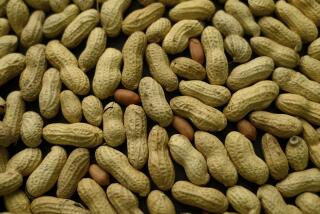Airline Policy on Peanuts Is Mixed Bag After DOT Raised Allergy Concerns
- Share via
Forget about whether your next flight will have a decent movie, comfortable pillows and enough overhead luggage space.
Will you or won’t you get peanuts at snack time?
After a flurry of news reports about peanut allergies a few months ago, many people got the impression that there’s an all-out peanut ban on U.S. carriers.
Not so, said Bill Mosley, a spokesman for the U.S. Department of Transportation.
The DOT did send letters to 10 major airlines last summer explaining that a medically certified allergy to peanuts constitutes a disability under the Air Carrier Access Act of 1986. The law requires that carriers accommodate such passengers.
Short of eliminating peanuts altogether, the DOT suggested that carriers set up peanut-free “buffer zones” when requested by allergic passengers.
The Food Allergy Network, a Virginia-based organization devoted to educating people about allergies, estimates that 5.2 million Americans have food allergies. About eight foods account for 90% of the allergic problems, with peanuts causing the majority of reactions, said Anne Munoz-Furlong, the network’s founder.
The first symptoms of food allergy, according to the American Academy of Allergy, Asthma & Immunology, often include itching of the lips, mouth and throat, perhaps followed by hives, nausea, vomiting and cramps--and, in severe reactions, anaphylactic shock. There are about 100 deaths a year in the U.S. from food-related allergies, according to the academy.
The DOT’s proposed peanut-free zones--at least one row in front of and one behind the affected passenger--are meant to reduce the chances of minute particles of nuts becoming airborne and affecting the most allergy-prone passengers.
But this fall, Congress decided not to give the DOT funds to enforce the policy on accommodating peanut-sensitive passengers.
“DOT still recommends what’s in the letter,” Mosley said. But without funding, enforcement and monitoring are impossible.
As a result, airline policy on peanuts is a mixed bag. Of half a dozen U.S. and international carriers contacted at random, most reported that they still serve peanuts. But they said they want to accommodate passengers who have an allergy problem with peanuts.
The letter clarifying DOT policy in August came after complaints from several allergic passengers, Mosley said.
“We don’t believe [airlines] need to stop serving peanuts,” Munoz-Furlong said. Her hope is that carriers will accommodate individual requests. She advises passengers with allergies to alert the carrier at least 72 hours before the flight.
“If a passenger says he has a peanut allergy, we will do our best to make sure that person is not served peanuts or is not around peanuts, but we can’t guarantee a peanut-free flight,” said an American Airlines spokeswoman.
Substitute snacks such as pretzels cost the same as peanuts, but many airline passengers expect peanuts. Most airlines say they are attempting to please those customers while accommodating passengers with peanut allergies.
For Southwest Airlines, “it’s impossible to have a peanut-free zone because we have no assigned seats,” said Carol Pearson, a spokeswoman. The airline often serves peanuts, she said, but if an allergic ticket-holder alerts the airline, peanuts will be pulled from that flight. Continental Airlines also will remove peanuts if requested in advance.
British Airways stopped serving peanuts more than a year ago, said John Lampley, a spokesman, although some flights keep them on board for passengers who request them. The airline’s switch to corn chips and other snacks has nothing to do with the DOT policy, he said. “We did it on our own. Several years ago, we were already getting complaints” about peanut allergies, he explained.
Qantas Airways still serves peanuts, but also offers alternatives such as cookies and raisins. Some airlines plan to phase out peanuts as their supplies dwindle. On America West, for instance, raisins are now served on morning flights.
Healthy Traveler appears on the second and fourth Sunday of the month.
More to Read
Inside the business of entertainment
The Wide Shot brings you news, analysis and insights on everything from streaming wars to production — and what it all means for the future.
You may occasionally receive promotional content from the Los Angeles Times.










